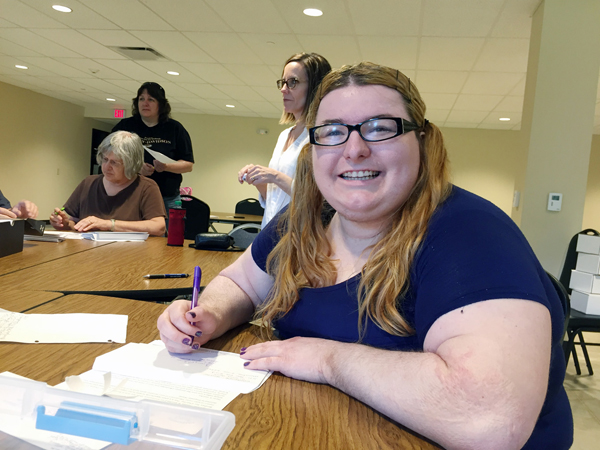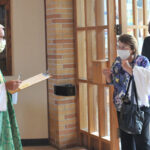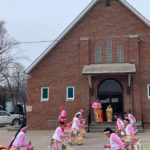Empower House looks to help survivors of brain injury

Kei Kei, a member of Empower House, the first brain injury clubhouse in Iowa, works on a fundraising letter for the new program, which helps survivors of brain injury to reconnect into life, the community and the workplace. Empower House is temporarily located at Sacred Heart Cathedral in Davenport while raising funds for a permanent clubhouse.
By Barb Arland-Fye
The Catholic Messenger
The Hopeful Household: a series about “the real issues that families are facing and where to find hope in the messiness of life.”
Sheila Boyd’s voice wavered as she stood at the podium during Mass to share her family’s experience living with brain injury resulting from her husband’s brain tumors and seizures.
She spoke about their personal crisis in front of her fellow parishioners at Our Lady of the River Catholic Church in LeClaire last month to demonstrate the need for Empower House, the first Brain Injury Clubhouse in Iowa. Bob, her husband, and Kami Holst, a fellow parishioner and occupational therapist, stood next to Sheila. All three are involved in Empower House, a nonprofit founded to “help brain injury survivors reconnect into life, the community and workplace (empowerhouseqca.org).”
More than 100,000 Iowans live with long-term disability from acquired brain injury, and the survival rate is increasing, said Geoffrey Lauer, executive director of Brain Injury Alliance of Iowa (BIAIA). Brain injury isn’t as visible as other disabilities. But loved ones and others see changes in personality or behavior, emotions, range of social ability or memory issues.
The good news, Geoffrey said, is that “people can rebuild and learn and re-engage.” The challenge: insurance coverage for rehabilitation services ends when people’s recovery begins to slow. Empower House aims to fill the gap, “to allow people with brain injury to re-engage in life and how to live well with brain injury.”
Sheila and Bob’s three sons Alex, Brandon and Ben were 10, 7 and 4 when their dad underwent emergency surgery eight years ago to remove a tumor the size of a fist from his brain. “Bob’s brain was swollen for three weeks, post-surgery, resulting in severe brain injury,” Sheila said. She remained at Bob’s bedside for the six months of hospitalization, inpatient and outpatient rehab. “I remember the nurses and doctors repeatedly telling me to go home and get rest,” Sheila recalled. They told her the hard part would come when she got home. “I didn’t believe it.”
Her day of reckoning came when Bob’s insurance coverage ended. Over the past eight years, he suffered two more brain tumors and seizures. Two years ago, he was diagnosed with dementia.
Life changes
Bob initially returned to work as a security guard with Securitas at a Kraft Foods plant in Davenport and his volunteer position with the LeClaire Fire Department. His employer and the fire department “tried very hard to keep him on, but sometimes it’s just not possible to function in a job on your own with the disabilities he had developed,” Sheila said. “We are grateful to both for trying to let him return and understand fully why he couldn’t handle the positions anymore.”
The family dynamics also changed. “Alex, at 10 years old, stepped up to the plate and kind of became the man of the house,” Sheila said. “It affected me,” Alex admitted. He wondered, “Why is my family different?” He didn’t tell many people about his dad’s condition because “it changes how they treat you.” It became the family’s responsibility to provide rehabilitation, to keep Bob occupied and safe. They dealt with depression. “You learn, you adapt,” said, Alex, 18, who just graduated from Pleasant Valley High School in Bettendorf and is headed to Iowa State University.
Kami, who provided Bob with occupational therapy, felt frustrated, too. The lack of services “is a huge gap in our community,” she said. “I don’t think people realize how many people out there have a brain injury and no place to go and no hope because of it.”
The big gap
Existing programs for people with developmental disabilities or dementia are not necessarily a good fit for adults with brain injuries. “Our folks were independent; they didn’t need help doing things on a daily basis,” said Missey Heinrichs, an Empower House founder. Even though he’s far from his senior years, Bob attends a respite program for older adults with dementia a couple of days a week at CASI in Davenport. Sheila pays for the service out of pocket, and can’t afford to send him there daily, she said. He would like to spend time with age-related peers.
That need compelled Kami to join three other health care professionals — Missey, her twin sister Michelle Owens, and Claire Motto — to found Empower House. They are grateful to Father Rich Adam for providing space at Sacred Heart Cathedral in Davenport for Empower House and hope to raise enough money to purchase a permanent home for the clubhouse.
Although she juggles her communications career with caring for Bob and her sons, Sheila also serves with the Empower House working group and attends weekly clubhouse meetings with Bob. The couple, along with Missey and Geoffrey of the Brain Injury Alliance of Iowa, lobbied the Iowa State Legislature in March on behalf of Empower House.
“Announcing (Empower House) in both the House and Senate showed our colleagues that it is important, and it gave all the legislators information on why they were there,” said Chris Cournoyer, whose district includes the couple’s hometown.
“I feel like I’m fulfilling my purpose in the community and for God,” Sheila said. Empower House is “truly a calling from God, we all feel that,” Kami said. “It’s totally our passion project.”
The roots of Empower House
Missey had been looking for resources for clients who were dealing with acquired brain injury and were nowhere near retirement age but could not return to work or school. “There wasn’t a lot for them to do,” she said.
She learned about a clubhouse model that began in 1948 through the determination of people with psychiatric disabilities who got help to develop a program to keep them busy and productive, to live independently, get some education and socialize with each other. More than 300 clubhouses exist worldwide but fewer than 30 focus on people with brain injuries, she said.
As a busy mom with four kids, Missey found a window of opportunity to develop Empower House during a transition between employers. “I took it as a part of God’s plan for what I should be doing. It’s an answer to my prayer … and to all of our members’ prayers.”
Empower House, when fully staffed and funded, will follow what Missey describes as a “work-ordered day.” Members will take care of the clubhouse, answering the phone, depositing lunch money in the bank, advocating for themselves in the community, learning how to find and keep jobs and cleaning and maintaining the clubhouse.
An afternoon at Empower House
“Let’s assign our jobs for today,” Missey tells 14 adults during a Thursday afternoon Empower House meeting last month. “Who wants to lead our icebreaker question?” While she waits for a volunteer, she tells the group about a new task: orientation. Someone needs to orient people who are new to Empower House. “I nominate LaDonna,” someone piped up. “I’m fine with that,” Ladonna responds.
Quentin, who goes by the nickname “Q,” introduces the icebreaker question: “What is your least favorite food?” For him, it’s cooked spinach. With each person identifying a least favorite food, the group reacts enthusiastically, for or against. “Baked fish,” Sheila’s husband, Bob declares. “I have a hard time getting him to CASI on the days they serve tilapia,” Sheila quipped.
Empower House’s members demonstrate a wide range of abilities. “We focus on abilities, not disabilities,” Missey said. No one wears uniforms or name tags to distinguish people with and without disabilities. They do fundraising, marketing and work to increase membership. They’ll have a big role in selecting the clubhouse location and help decide how to furnish it. Members hope to raise funds to purchase a building in the Quad Cities that will become the permanent Empower House and provide staffing for it.
Q, who is 53, suffered two traumatic brain injuries, the first in a motorcycle accident 33 years ago and the second after he developed leukemia. He talked about his efforts to rebuild his life as he made copies of fundraising letters. Other members stuffed envelopes and labeled them. Q uses a wheelchair, but is working toward walking with assistance. “I want to do something instead of busy work,” he said.
At Empower House the staff to member ratio is small, intentionally. “The members are here to do work, not the staff.” They take attendance to keep track of who’s missing. “We call and reach out,” Missey said.
A sense of purpose
“If I could go back in time, I wish there was a place like Empower House after Bob’s brain tumor,” Sheila said. “Our struggles would have been fewer; we wouldn’t have felt so isolated in our quest to try and give Bob a meaningful life. But, we have the opportunity now and the chance to provide this for families like us in the future. You never know when and if this might happen to you. We never thought this would happen to us.”
Empower House provides members with unconditional love, Sheila said. “The same unconditional love that God has for all of us every day. Empower House is a place of acceptance, belonging and understanding.”
As a caregiver, “your genuine goal is to give the person you are caring for the best life you can. “The journey has never been easy, but we are learning why God has carried us down this path. He has chosen us to be able to help other families learn to cope and bring back a sense of belonging and purpose to those who have felt so isolated and alone.”











